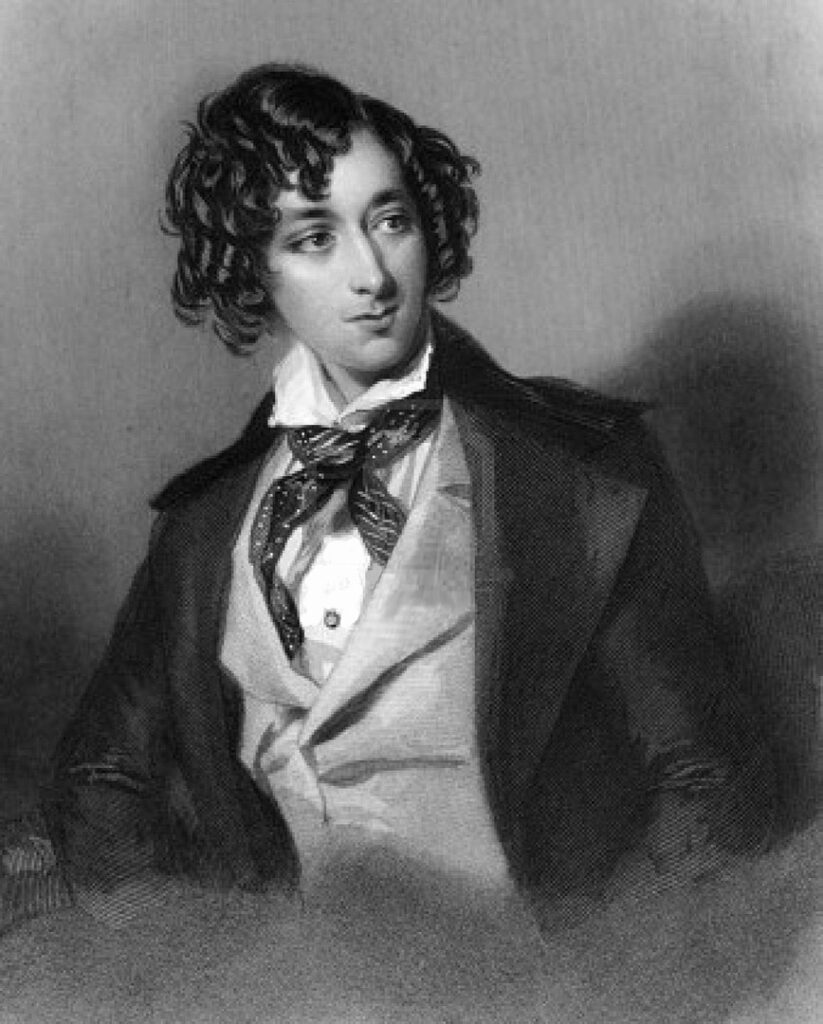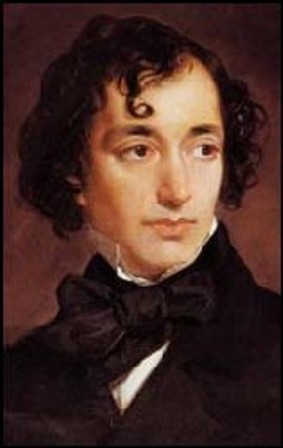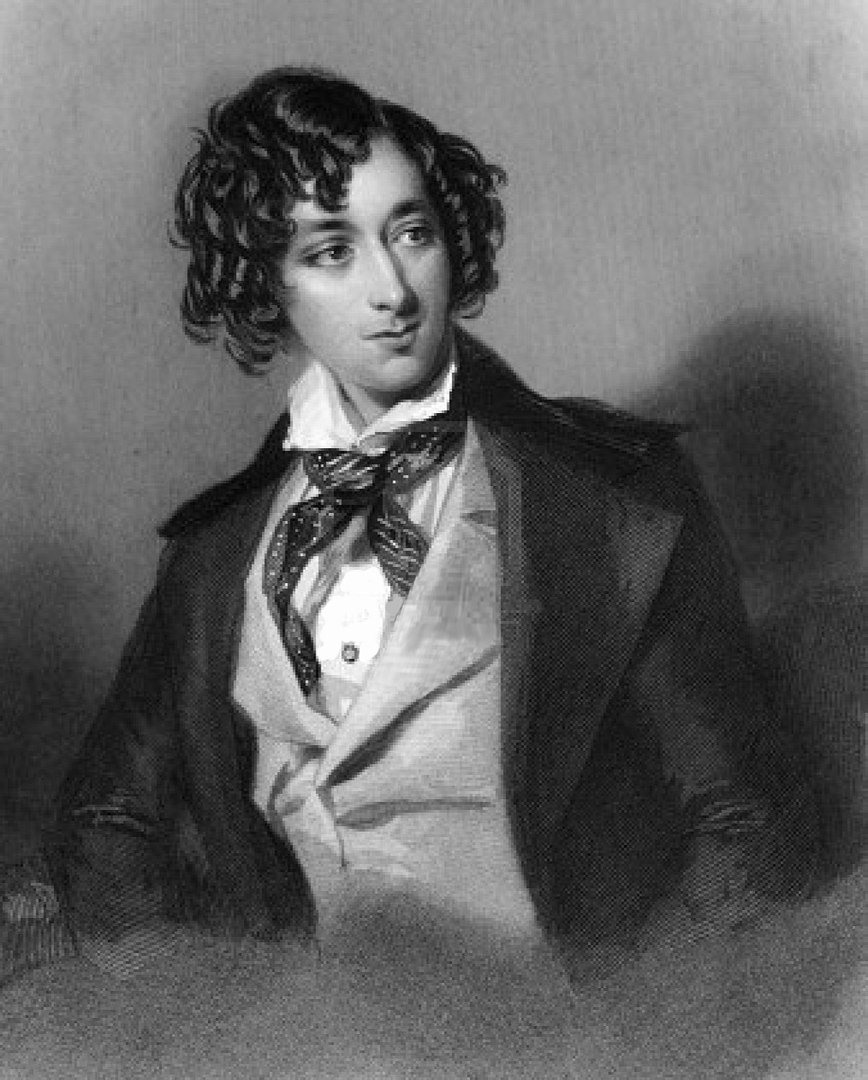
The Dandy School
By William Hazlitt
The Examiner, 1827
Vivian Grey is dedicated to the Best and Greatest of men, as if the Illustrious Person who will take this compliment to himself approved of the sentiments contained in it. Are ushers odious to the Best and Greatest of men? Does he hate the great mass of his subjects, and scorn all those beyond Temple-bar? Is he King only of the Dandies, and Monarch of the West? We scarcely believe it. This volume with its impertinent dedication is no more expressive of the sentiments of his heart than the Austrian Catechism, dedicated in like manner, would be characteristic of the principles of his reign. Oh! Mr. Grey, you should have been more humble — you should have inscribed your work to the best-dressed Man in his Majesty’s dominions — or to Jack Ketch.
It was formerly understood to be the business of literature to enlarge the bounds of knowledge and feeling; to direct the mind’s eye beyond the present moment and the present object; to plunge us in the world of romance, to connect different languages, manners, times together; to wean us from the grossness of sense, the illusions of self-love; — by the aid of imagination, to place us in the situations of others and enable us to feel an interest in all that strikes them; and to make books the faithful witnesses and interpreters of nature and the human heart.
Of late, instead of this liberal and useful tendency, it has taken a narrower and more superficial tone. All that we learn from it is the servility, egotism, and upstart pretensions of the writers. Instead of transporting you to faery-land or into the middle ages, you take a turn down Bond Street or go through the mazes of the dance at Almack’s. You have no new inlet to thought or feeling opened to you; but the passing object, the topic of the day (however insipid or repulsive) is served up to you with a self-sufficient air, as if you had not already had enough of it. You dip into an Essay or a Novel, and may fancy yourself reading a collection of quack or fashionable advertisements: — Macassar Oil, Eau de Cologne, Hock and Seltzer Water, Otto of Roses, Pomade Divine glance through the page in inextricable confusion, and make your head giddy. Far from extending your sympathies, they are narrowed to a single point, the admiration of the folly, caprice, insolence, and affectation of a certain class; — so that with the exception of people who ride in their carriages, you are taught to look down upon the rest of the species with indifference, abhorrence, or contempt. A school-master in a black coat is a monster — a tradesman and his wife who eat cold mutton and picked cabbage are wretches to be hunted out of society. That is the end and moral of it: it is part and parcel of a system.
The Dandy School give the finishing touch to the principles of paternal government. First comes the political sycophant, and makes the people over to their rulers as a property in perpetuity; but then they are to be handled tenderly, and need not complain, since the sovereign is the father of his people, and we are to be all one family of love. So says the Austrian Catechism. Then comes the literary sycophant to finish what the other had begun; and the poor fools of people having been caught in the trap of plausible professions, he takes off the mask of paternity, treats them as of a different species instead of members of the same family, loads them with obloquy and insult, and laughs at the very idea of any fellow feeling with or consideration towards them, as the height of bad taste, weakness, and vulgarity. So say Mr. Theodore Hook and the author of Vivian Grey. So says not Sir Walter. Ever while you live, go to a man of genius in preference to a dunce; for let his prejudices or his party be what they may, there is still a saving grace about him, for he himself has something else to trust to besides his subserviency to greatness to raise him from insignificance.
He takes you and places you in a cottage or a cavern, and makes you feel the deepest interest in it, for you feel all that its inmates feel. The Dandy School tell you all that a dandy would feel in such circumstances, viz. that he was not in a drawing-room or at Long’s. Or if he does forfeit his character for a moment, he at most brings himself to patronise humanity, condescends to the accidents of common life, touches the pathetic with his pen as if it were with a pair of tongs, and while he just deigns to notice the existence or endure the infirmities of his fellow-creatures, indemnifies his vanity by snatching a conscious glance at his own person and perfections. Whatever is going on, he himself is the hero of the scene; the distress (however excruciating) derives its chief claim to attention from the singular circumstance of his being present; and he manages the whole like a piece of private theatrics with an air of the most absolute nonchalance and decorum. The WHOLE DUTY OF MAN is turned into a butt and bye-word, or like Mr. Martin’s bill for humanity to animals, is a pure voluntary, a caprice of effeminate sensibility: the great business of life is a kind of masquerade or melo-drame got up for effect and by particular desire of the Great.
We soon grow tired of nature so treated, and are glad to turn to the follies and fopperies of high life, into which the writer enters with more relish, and where he finds himself more at home. So Mr. Croker (in his place in the House of Commons) does not know where Bloomsbury Square is: thus affecting to level all the houses in the metropolis that are not at the court-end, and leaving them tenantless by a paltry sneer, as if a plague had visited them. It is no wonder that his proteges and understrappers out of doors should echo this official impertinence — draw the line still closer between the East and West-end — arrest a stray sentiment at the corner of a street, relegate elegance to a fashionable square — annihilate all other enjoyments, all other pretensions but those of their employers — reduce the bulk of mankind to a cypher, and make all but a few pampered favourites of fortune dissatisfied with themselves and contemptible to one another.
The reader’s mind is so varnished over with affectations that not an avenue to truth or feeling is left open, and it is stifled for want of breath. Send these people across the Channel who make such a fuss about the East and West-end, and no one can find out the difference.* The English are not a nation of dandies; nor can John Bull afford (whatever the panders to fashion and admirers of courtly graces may say to the contrary) to rest all his pretensions upon that. He must descend to a broader and more manly level to keep his ground at all. Those who would persuade him to build up his fame on frogged coats or on the embellishments of a snuff-box, he should scatter with one loud roar of indignation and trample into the earth like grasshoppers, as making not only a beast but an ass of him.
A writer of this accomplished stamp, comes forwards to tell you, not how his hero feels on any occasion, for he is above that, but how he was dressed, and makes him a mere lay-figure of fashion with a few pert, current phrases in his mouth. The Sir Sedley Clarendels and Meadowses of a former age are become the real fine gentlemen of this. Then he gives you the address of his heroine’s milliner, lest any shocking surmise should arise in your mind of the possibility of her dealing with a person of less approved taste, and also informs you that the quality eat fish with silver forks. This is all he knows about the matter: is this all they feel? The fact is new to him: it is old to them. It is so new to him and he is so delighted with it, that provided a few select persons eat fish with silver forks, he considers it a circumstance of no consequence if a whole country starves: but these privileged persons are not surely thinking all the time and every day of their lives of that which Mr. Theodore Hook has never forgotten since he first witnessed it, viz. that they eat their fish with a silver fork. What then are they thinking of in their intervals of leisure — what are their feelings that we can be supposed to know nothing of? Will Mr. Theodore Hook, who is “comforted with their bright radiance, though not in their sphere,” condescend to give us a glimpse of these, that we may admire their real elegance and refinement as much as he does a frogged coat or silver fork? It is cruel in him not to do so. “The court, as well as we, may chide him for it.”
He once criticised a city feast with great minuteness and bitterness, in which (as it appears) the side-board is ill-arranged, the footman makes a blunder, the cook has sent up a dish too little or too highly seasoned. Something is wanting, as Mr. Hook insinuates is necessarily the case whenever people in the neighbourhood of Russell Square give dinners. But that something is not the manners of conversation of gentlemen — this never enters his head — but something that the butler, the cook or the valet of people of fashion could have remedied quite as well (to say the least) as their masters. It is here the cloven-foot, the under-bred tone, the undue admiration of external circumstances breaks out and betrays the writer. Mr. Hook has a fellow-feeling with low life or rather with vulgarity aping gentility, but he has never got beyond the outside of what he calls good society. He can lay the cloth or play the buffoon after dinner — but that is the utmost he can pretend to.
We have in Sayings and Doings and in Vivian Grey abundance of Lady Marys and Lady Dorothys, but they are titles without characters, or the blank is filled up with the most trite impertinence. So a young linen-draper or attorney’s-clerk from the country, who had gained a thirty-thousand pound prize in the lottery and wished to set up for a fine gentleman, might learn from these Novels what hotel to put up at, what watering place to go to, what hatter, hosier, tailor, shoemaker, friseur to employ, what part of the town he should be seen in, what theatre he might frequent; but how to behave, speak, look, feel, and think in his new and more aspiring character he would not find the most distant hint in the gross caricatures or flimsy sketches of the most mechanical and shallow of all schools. It is really as if, in lieu of our royal and fashionable “Society of Authors,” a deputation of tailors, cooks, lacqueys, had taken possession of Parnassus, and had appointed some Abigail out of place perpetual Secretary. The Congreves, Wycherleys, and Vanbrughs of former days gave us some taste of gentility and courtly refinement in their plays: enchanted us with their Millamants, or made us bow with respect to their Lord Townleys. It would seem that the race of these is over, or that our modern scribes have not had access to them on a proper footing — that is, not for their talents or conversation, but as mountebanks or political drudges.
At first it appears strange that persons of so low a station in life should be seized with such a rage to inveigh against themselves, and make us despise all but a few arrogant people, who pay them ill for what they do. But this is the natural process of servility, and we see all valets and hangers-on of the Great do the same thing. The powdered footman looks down on the rabble that dog his master’s coach as beneath his notice. He feels the one little above him, and the other (by consequence) infinitely below him. Authors at present would be thought gentlemen, as gentlemen have a fancy to turn authors. The first thing a dandy scribbler does is to let us know he is dressed in the height of the fashion (otherwise we might imagine him some miserable garretteer, distinguished only by his poverty and learning) — and the next thing he does is to make a supercilious allusion to some one who is not so well dressed as himself. He then proceeds to give us a sparkling account of his Champagne and of his box at the Opera. A newspaper hack of this description also takes care to inform us that the people at the Opera in general, the Mr. Smiths and the Mr. Browns, are not good enough for him, and that he shall wait to begin his critical lucubrations, till the stars of fashion meet there in crowds and constellations!
At present, it should seem that a seat on Parnassus conveys a title to a box at the Opera, and that Helicon no longer runs water but champagne. Literature, so far from supplying us with intellectual resources to counterbalance immediate privations, is made an instrument to add to our impatience and irritability under them, and to nourish our feverish, childish admiration of external show and grandeur. This rage for fashion and for fashionable writing seems becoming universal, and some stop must be put to it, unless it cures itself by its own excessive folly and insipidity.
It is well that the Editor of the John Bull wrote the Sayings and Doings. It solves the problem with how small a quantity of wit a person without character or principle may set up for a political mouthpiece. Nothing but the dullness of the one could account for the impudence and effect of the other. No one who could write a line of wit or sense could bring himself from an inducement to repeat the same nickname, the same stale jest, for weeks and months together. If the Editor of the John Bull had any resources in himself beyond the most vulgar slang and hackneyed abuse, if he had any sense of shame at resorting to the same wretched pun or more wretched calumny, week after week, as he is paid for it, he would be unfit for his task: he would no longer be the complete and unequivocal organ of the dullness, prejudices, malice, and callous insensibility of his party. No argument tells with a minister of State like calling a man a Jacobin and a Reformer for the fortieth time: the sleek Divine chuckles at a dirty allusion for the fortieth time with unabated glee. Mr. Hook, among wits, might be called the parson’s nose: or perhaps the title of Mr. Vivacity Dull would suit him as well. What a dearth of invention, what a want of interest, what a fuss about nothing, what a dreary monotony, what a pert slipshop jargon runs through the whole series of the author’s tales! But what a persevering, unabashed confidence, what a broad-shouldered self-complacency, what robust health, what unrelenting nerves he must possess to inflict them on his readers! Not one ray, not one line — but all the refuse of the Green-room, the locomotions of a booth at a fair, the humours of a Margate hoy, the grimace of a jack-pudding, the sentimentalities and hashed-up scandal of a lady’s maid, the noise and hurry of a chaise and four, the ennui and vacancy of a return post-chaise!
The smart improvisatori turns out the most wearisome of interminable writers. At a moment’s warning he can supply something that is worth nothing, and in ten times the space he can spin out ten times the quantity of the same poor trash. Would the public read Sayings and Doings? Would Mr. Colburn print them? No, but they are known to be the work of the Editor of the John Bull, of that great and anonymous abstract of wit, taste, and patriotism, who, like a Ministerial trull, calls after you in the street, dubs Mr. Waithman Lord Waithman, cries Humbug whenever humanity is mentioned; invades the peace of private life, out of regard to religion and social order; cuts a throat out of good nature, and laughs at it; and claps his Majesty familiarly on the shoulder, as the best of Kings! Do you wonder at the face, the gravity, the impenetrable assurance required to do all this, and to do it not once, but once a-week? Read Sayings and Doings, and the wonder ceases; you see it is because he can do nothing else! He will feel obliged to us for this character: his patrons were beginning to forget his qualifications.
* It is amusing to see an English woman in the streets of Paris looking like a dowdy, and scarcely able to put one foot before another for very awkwardness and shame, who but a week before she left home had perhaps trampled on a dress brought home to her, in a fit of uncontrollable rage, thrown a cap into the fire, and kicked her milliner down stairs for bringing her such unfashionable trumpery. One would scarcely believe that a mere change of place would make such an alteration in behaviour. When we see our country-women so unpleasantly situated, we are naturally both ashamed and sorry for them: but, as in this case, we pity many of them more than they deserve.


So, this is the origin of the ‘Silver Fork’ novel category… it seems Hazlitt regarded early offerings as pretty tarnished – although I’ve started reading ‘Tremaine’ which certainly comes alive with insight (…after 180 pages)!
And in a way that would address Hazlitt’s main objection about superficial storytelling: for we get to gaze through the eyes of a Whites’ coxcomb, onto St James’s street in dandy days.
So a measure of that lost mystery:
“What then are they thinking of in their intervals of leisure — what are their feelings that we can be supposed to know nothing of?”
…is gladly (or shamefully!) preserved in print after all…